Unit 1 Section A 2d&Grammar focus-3c课件 (新目标七年级下册Unit 1 Can you play the guitar?)
文档属性
| 名称 | Unit 1 Section A 2d&Grammar focus-3c课件 (新目标七年级下册Unit 1 Can you play the guitar?) | 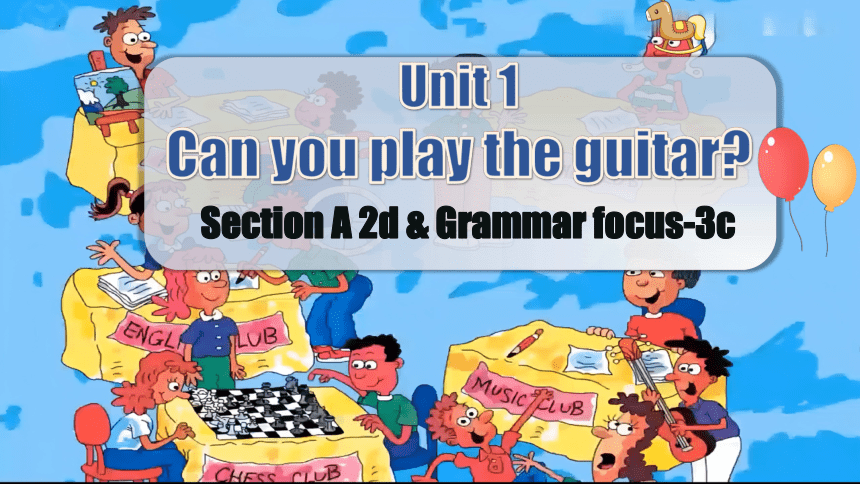 | |
| 格式 | pptx | ||
| 文件大小 | 54.1MB | ||
| 资源类型 | 试卷 | ||
| 版本资源 | 人教新目标(Go for it)版 | ||
| 科目 | 英语 | ||
| 更新时间 | 2024-02-23 19:08:23 | ||
图片预览


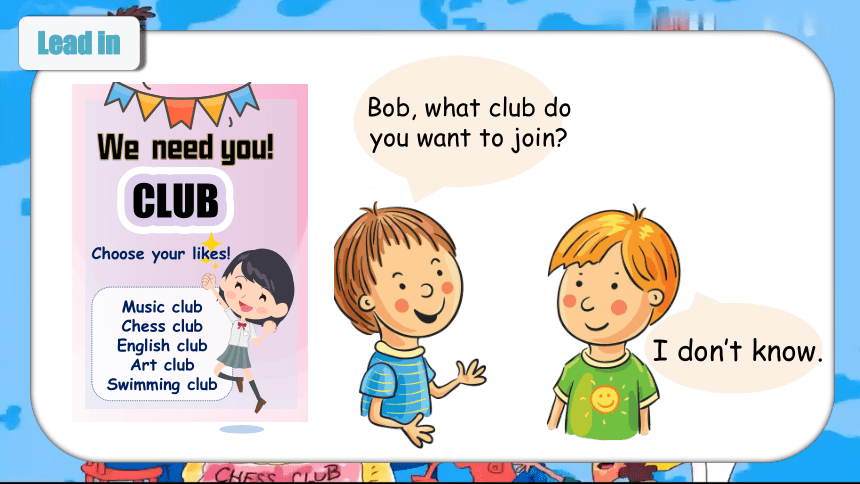
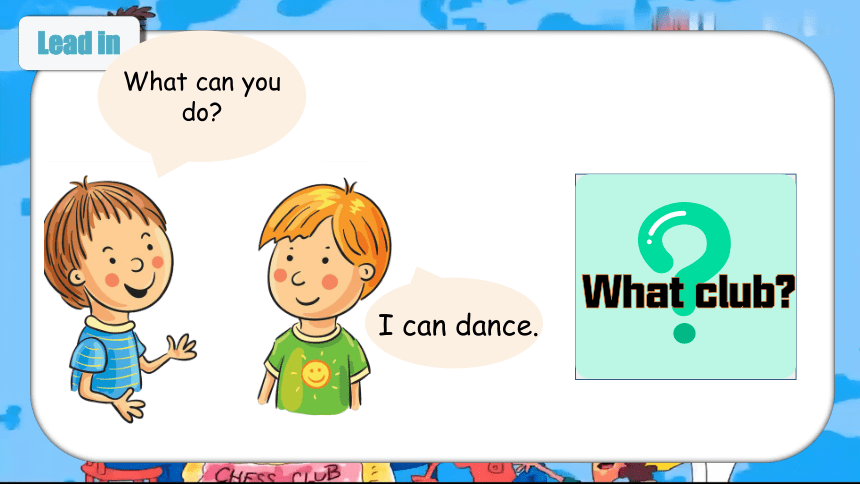
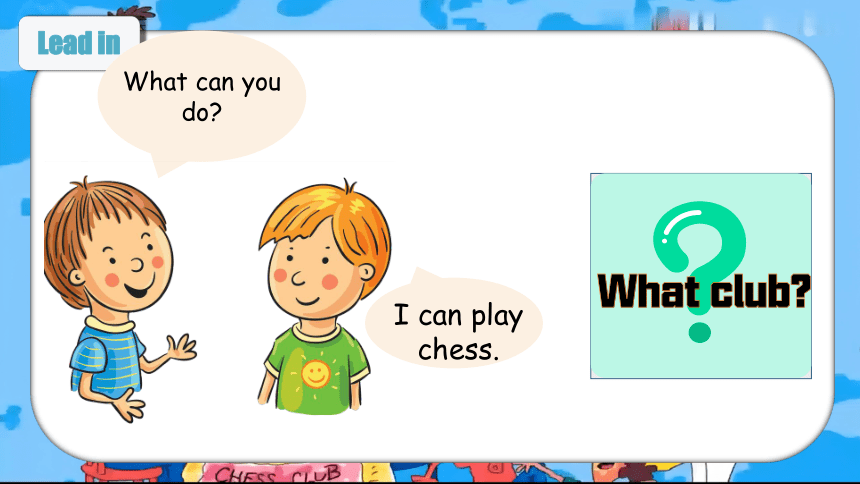
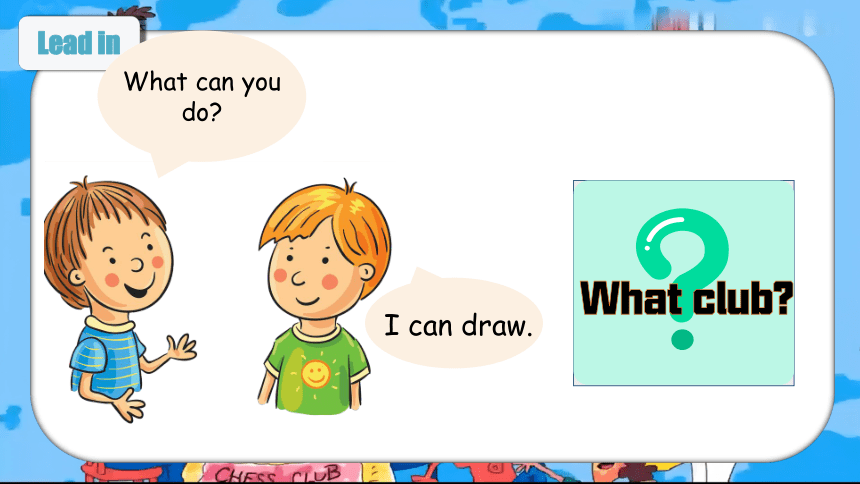


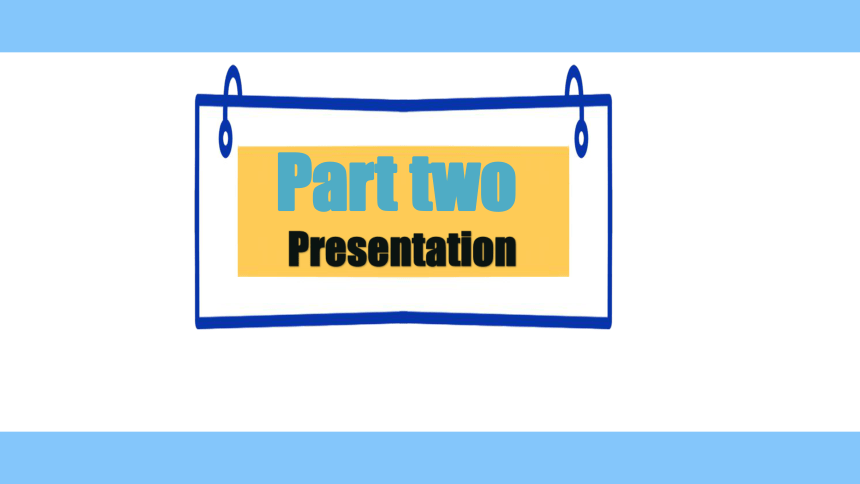
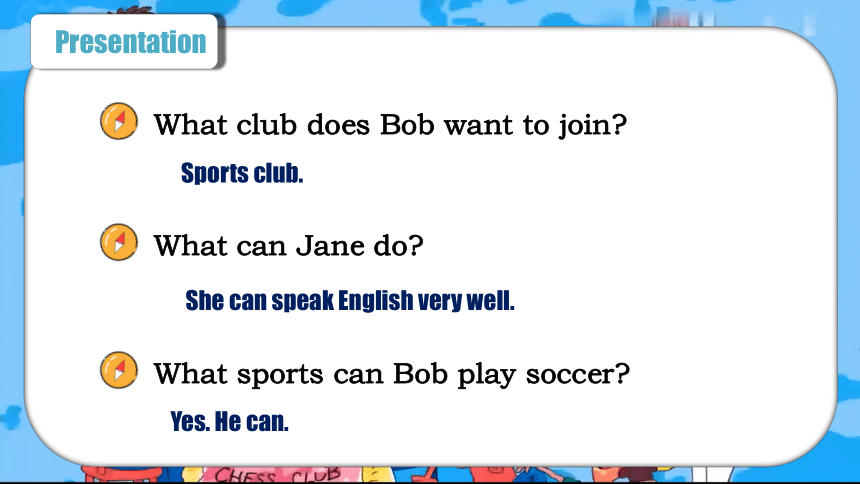
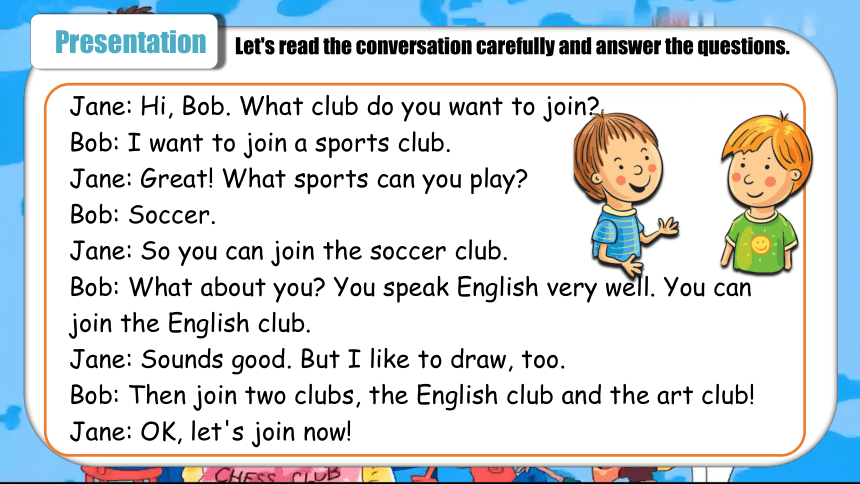
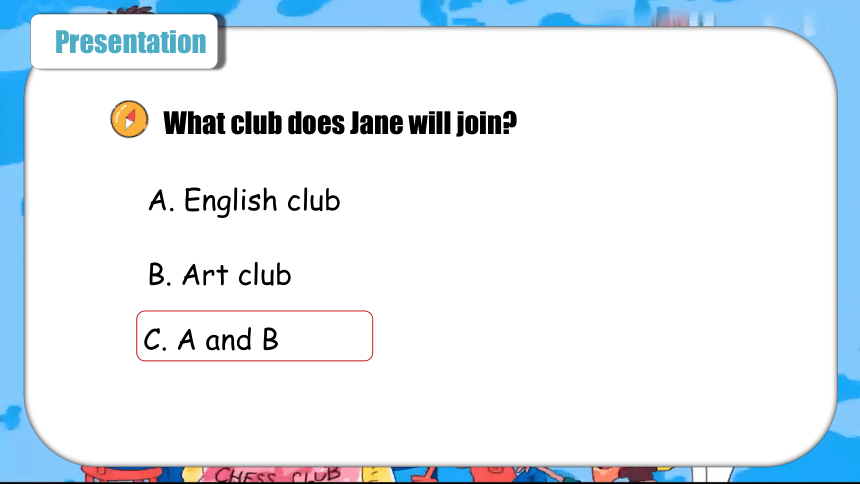
文档简介
(共40张PPT)
目录
01
02
03
04
05
06
07
08
Lead in
Pre-listening
While-listening
Post-listening
Summary
Exercises
Homework
Language points
We need you!
CLUB
CLUB
CLUB
Music club
Chess club
English club
Art club
Swimming club
Choose your likes!
Bob, what club do you want to join
I don’t know.
What can you do
I can dance.
Music club
What club
What can you do
I can play
chess.
Chess club
What club
What can you do
I can draw.
Art club
What club
What can you do
I can swim.
Swimming club
What club
What can you do
I can speak English.
English club
What club
What club does Bob want to join
What can Jane do
What sports can Bob play soccer
Sports club.
She can speak English very well.
Yes. He can.
Let's read the conversation carefully and answer the questions.
Jane: Hi, Bob. What club do you want to join
Bob: I want to join a sports club.
Jane: Great! What sports can you play
Bob: Soccer.
Jane: So you can join the soccer club.
Bob: What about you You speak English very well. You can join the English club.
Jane: Sounds good. But I like to draw, too.
Bob: Then join two clubs, the English club and the art club!
Jane: OK, let's join now!
What club does Jane will join
A. English club
B. Art club
C. A and B
So you can join the soccer club.
can是情态动词,用在陈述句中多表示主语做某事的能力,意为“能,会”;有时也可表示“可能”。
She draws.
She can draw.
肯定句:主语+can + 动词原形…
情态动词是动词的一种,表示说话人的语气和情态等,有一定的意义,不能单独作谓语必须和实义动词或连系动词连用构成谓语。并且情态动词后用动词原形!
I can draw.
can 之前 加 not
can not=can’t
把can提前,
I 变you
句号变问号。
肯定句
否定句
一般疑问句
I can not draw.
Can you draw
情态动词can
肯定句:主语+can + 动词原形...
否定句:主语+____+ 动词原形...
can’t
情态动词can
一般疑问句:
Can + 主语+实意动词
肯定回答:
否定回答:
Yes, 主语+can.
No, 主语+can’t.
情态动词can
特殊疑问句:
特殊疑问词 + can + 主语 + 动词原形
含有can的句子句式结构 肯定句 主语 + can + 动词原形 + 其他.
否定句 主语 + can’t/cannot + 动词原形+其他.
一般疑问句 Can + 主语 + 动词原形 + 其他
肯定回答:Yes, 主语 + can.
否定回答:No, 主语 + can’t.
特殊疑问句 特殊疑问词 + can + 主语 + 动词原形+其他
Let's conclude!
肯定句
否定句
一般疑问句
特殊疑问句
根据肯定句,写出其他句子类型。
I can play chess.
I can‘t play chess.
Can you play chess
Yes, I can./ No, I can’t.
-What can you do - I can play chess.
Jane: Hi, Bob. What club do you want to join
Bob: I want to join a sports club.
Jane: Great! What sports can you play
Bob: Soccer.
Jane: So you can join the soccer club.
Bob: What about you You speak English very well. You can join the English club.
Jane: Sounds good. But I like to draw, too.
Bob: Then join two clubs, the English cluband the art club!
Jane: OK, let's join now!
Let's read the conversation after the tape.
3a
Write questions and answers with the words and phrases.
Wu Jun
speak English
speak Chinese
1.
Mike
play basketball
play tennis
2.
Jane and Jill
dance
sing
3.
Can Wu Jun speak English No, he can't, but he can speak Chinese.
Can Mike play basketball No, he can't, but he can play tennis.
Can Jane and Jill dance No, they can't, but they can sing.
Grace
play soccer
play volleyball
4.
Bill
write stories
tell stories
5.
4. Grace/play soccer/play volleyball
S. Bill/write stories/tell stories
Can Grace play soccer No, she can't, but she can play volleyball.
Can Bill play soccer No, he can't, but he can tell stories.
3b
Complete the following poster with the words in the box.
Students Wanted for School ShowWe want students for the school show. Can you . Can youthe guitar Can youstories Please talk to Mr. Zhang after school
We want students for the school show. Can you______or______ Can you ______the guitar Can you ______stories Please talk to Mr. Zhang after school.
Students Wanted for School Show
play
sing
tell
dance
play
sing
dance
tell
学校(文艺)表演招募学生
show n. 演出;节目 v. 给……看;展示
海报的基本要素:标题、正文(活动名称、应聘者所需才能、活动联系人)、与之匹配的图片
What can your group do in the school show Make a list.
3c
School Show!
Time:Sunday 6:00 p.m.
Location: music room
What can you do
Come and show us!
Make a survey in your group.
Name
What can you do
Li Xin
do Kongfu
.....
.....
Hi, I am Alan. In my group, Li Xin can do kung fu...
3c
School Show!
Time:Sunday 6:00 p.m.
Location: music room
What can you do
Come and show us!
Report to the class. (汇报采访结果)
1
You're very good at telling stories.你很擅长讲故事
be good at意为“擅长”,相当于 do well in,
at 后可接名词、代词或动词的-ing 形式例: He is good at English.他擅长英语 She is good at playing chess.
=She does well in playing chess她擅长下国际象棋
要点 1
1
You're very good at telling stories.你很擅长讲故事
要点 2
tell当“讲述;叙述”讲时,后跟故事、笑话、秘密等。例: His mother can tell many stories他妈妈会讲许多故事
tell也可意为“告诉;指示,吩咐”例: Our teacher tells us to watch The Readers.我们的老师让我们观看《朗读者》l tell sb.( not ) to do sth.告诉某人(不要)做某事l tell sb. sth( =tellsth. to sb.)告诉某人某事l tell sb. about sth.告诉某人关于某事
2
write stories写故事
write 既可作及物动词,也可作不及物动词,意为“写作;写字”
例: He is writing book.他正在写一本书 The children are learning to write.孩子们正在学习写字
l write (letter) to sb,给某人写信l write down 写下,记下例: She wrote to him in France.她给在法国的他写信 Write down the address before you forget it.把地址记下来,免得忘了
3
Can you sing or dance 你会唱歌或者跳舞吗
or连词,常见的用法有: l 意为“或者,还是”,用于引出另外一种可能性例: You can come here by bus or by bike.你可以乘公共汽车或者骑自行车来这儿。How old are you,12,13or 14 你多大了,12岁、13岁还是14岁 l 意为“也不”,用在否定句中代替and。例: I don't like comedies or thrillers.(=I don't like comedies and don't like thrillers.)我不喜欢喜剧片和恐怖片l 意为“否则;不然”,用于“祈使句+or+陈述句(一般将来时)”句型,其中祈使句相当于if条件句例: Hurry up,or you'll be late.快点儿,否则你将会迟到。
3
Can you sing or dance 你会唱歌或者跳舞吗
辨析 or, and, but 与so
or “或者”,表示选择关系
and “和,又”,表示并列关系,常用来连接表示对等成分的单词短语或者句子,表示意思的顺延或增补
but “但是”,表示转折关系,所连接的成分意思相反或相对
so “因此,所以”,常用来引导结果状语从句
4
Please talk to Mr. Zhang after school.请放学后跟张老师说
talk to... 意为“跟......说”。
talk to “跟......说”,强调一方说,另一方听,to 表示方向
talk with “和/与......谈话”,强调谈话对象是双向交流
talk about “谈论”,涉及谈话内容和具体情况
talk of “谈起,谈到”,只涉及某人或某事,不涉及内容
辨析: talk to, talk with, talk about 与 talk of
Summary
1
2
Sentences:
Words:
1. I want to join the art club.
2. You're very good at telling stories.
3.Can you sing or dance
4. Please talk to Mr Zhang after school.
tell,talk, speak, join, or, show, sing, dance
肯定句
一般疑问句
否定句
情态动词can
特殊疑问句
(1) 意为_______;有时也可表示“可能”。
(2)肯定句变否定句时,需在can后加______,其缩写形式为_____
将情态动词 can 直接放在_____,构成一般疑问句。
“能,会”
not
can’t.
句首
在一般疑问句的基础上,加___________
特殊疑问词
含can的一般疑问句
肯定回答:
否定回答:
肯定回答:
否定回答:
“OK./All right,”
“No,...can't.”
“Yes,...can.”
“No,...can't.”
1. 表示请求
2. 要求给予
许可
Level B:
Master what you have learned in this lesson.
Level A:
Finish the extra exercise in your workbook.
目录
01
02
03
04
05
06
07
08
Lead in
Pre-listening
While-listening
Post-listening
Summary
Exercises
Homework
Language points
We need you!
CLUB
CLUB
CLUB
Music club
Chess club
English club
Art club
Swimming club
Choose your likes!
Bob, what club do you want to join
I don’t know.
What can you do
I can dance.
Music club
What club
What can you do
I can play
chess.
Chess club
What club
What can you do
I can draw.
Art club
What club
What can you do
I can swim.
Swimming club
What club
What can you do
I can speak English.
English club
What club
What club does Bob want to join
What can Jane do
What sports can Bob play soccer
Sports club.
She can speak English very well.
Yes. He can.
Let's read the conversation carefully and answer the questions.
Jane: Hi, Bob. What club do you want to join
Bob: I want to join a sports club.
Jane: Great! What sports can you play
Bob: Soccer.
Jane: So you can join the soccer club.
Bob: What about you You speak English very well. You can join the English club.
Jane: Sounds good. But I like to draw, too.
Bob: Then join two clubs, the English club and the art club!
Jane: OK, let's join now!
What club does Jane will join
A. English club
B. Art club
C. A and B
So you can join the soccer club.
can是情态动词,用在陈述句中多表示主语做某事的能力,意为“能,会”;有时也可表示“可能”。
She draws.
She can draw.
肯定句:主语+can + 动词原形…
情态动词是动词的一种,表示说话人的语气和情态等,有一定的意义,不能单独作谓语必须和实义动词或连系动词连用构成谓语。并且情态动词后用动词原形!
I can draw.
can 之前 加 not
can not=can’t
把can提前,
I 变you
句号变问号。
肯定句
否定句
一般疑问句
I can not draw.
Can you draw
情态动词can
肯定句:主语+can + 动词原形...
否定句:主语+____+ 动词原形...
can’t
情态动词can
一般疑问句:
Can + 主语+实意动词
肯定回答:
否定回答:
Yes, 主语+can.
No, 主语+can’t.
情态动词can
特殊疑问句:
特殊疑问词 + can + 主语 + 动词原形
含有can的句子句式结构 肯定句 主语 + can + 动词原形 + 其他.
否定句 主语 + can’t/cannot + 动词原形+其他.
一般疑问句 Can + 主语 + 动词原形 + 其他
肯定回答:Yes, 主语 + can.
否定回答:No, 主语 + can’t.
特殊疑问句 特殊疑问词 + can + 主语 + 动词原形+其他
Let's conclude!
肯定句
否定句
一般疑问句
特殊疑问句
根据肯定句,写出其他句子类型。
I can play chess.
I can‘t play chess.
Can you play chess
Yes, I can./ No, I can’t.
-What can you do - I can play chess.
Jane: Hi, Bob. What club do you want to join
Bob: I want to join a sports club.
Jane: Great! What sports can you play
Bob: Soccer.
Jane: So you can join the soccer club.
Bob: What about you You speak English very well. You can join the English club.
Jane: Sounds good. But I like to draw, too.
Bob: Then join two clubs, the English cluband the art club!
Jane: OK, let's join now!
Let's read the conversation after the tape.
3a
Write questions and answers with the words and phrases.
Wu Jun
speak English
speak Chinese
1.
Mike
play basketball
play tennis
2.
Jane and Jill
dance
sing
3.
Can Wu Jun speak English No, he can't, but he can speak Chinese.
Can Mike play basketball No, he can't, but he can play tennis.
Can Jane and Jill dance No, they can't, but they can sing.
Grace
play soccer
play volleyball
4.
Bill
write stories
tell stories
5.
4. Grace/play soccer/play volleyball
S. Bill/write stories/tell stories
Can Grace play soccer No, she can't, but she can play volleyball.
Can Bill play soccer No, he can't, but he can tell stories.
3b
Complete the following poster with the words in the box.
Students Wanted for School ShowWe want students for the school show. Can you . Can youthe guitar Can youstories Please talk to Mr. Zhang after school
We want students for the school show. Can you______or______ Can you ______the guitar Can you ______stories Please talk to Mr. Zhang after school.
Students Wanted for School Show
play
sing
tell
dance
play
sing
dance
tell
学校(文艺)表演招募学生
show n. 演出;节目 v. 给……看;展示
海报的基本要素:标题、正文(活动名称、应聘者所需才能、活动联系人)、与之匹配的图片
What can your group do in the school show Make a list.
3c
School Show!
Time:Sunday 6:00 p.m.
Location: music room
What can you do
Come and show us!
Make a survey in your group.
Name
What can you do
Li Xin
do Kongfu
.....
.....
Hi, I am Alan. In my group, Li Xin can do kung fu...
3c
School Show!
Time:Sunday 6:00 p.m.
Location: music room
What can you do
Come and show us!
Report to the class. (汇报采访结果)
1
You're very good at telling stories.你很擅长讲故事
be good at意为“擅长”,相当于 do well in,
at 后可接名词、代词或动词的-ing 形式例: He is good at English.他擅长英语 She is good at playing chess.
=She does well in playing chess她擅长下国际象棋
要点 1
1
You're very good at telling stories.你很擅长讲故事
要点 2
tell当“讲述;叙述”讲时,后跟故事、笑话、秘密等。例: His mother can tell many stories他妈妈会讲许多故事
tell也可意为“告诉;指示,吩咐”例: Our teacher tells us to watch The Readers.我们的老师让我们观看《朗读者》l tell sb.( not ) to do sth.告诉某人(不要)做某事l tell sb. sth( =tellsth. to sb.)告诉某人某事l tell sb. about sth.告诉某人关于某事
2
write stories写故事
write 既可作及物动词,也可作不及物动词,意为“写作;写字”
例: He is writing book.他正在写一本书 The children are learning to write.孩子们正在学习写字
l write (letter) to sb,给某人写信l write down 写下,记下例: She wrote to him in France.她给在法国的他写信 Write down the address before you forget it.把地址记下来,免得忘了
3
Can you sing or dance 你会唱歌或者跳舞吗
or连词,常见的用法有: l 意为“或者,还是”,用于引出另外一种可能性例: You can come here by bus or by bike.你可以乘公共汽车或者骑自行车来这儿。How old are you,12,13or 14 你多大了,12岁、13岁还是14岁 l 意为“也不”,用在否定句中代替and。例: I don't like comedies or thrillers.(=I don't like comedies and don't like thrillers.)我不喜欢喜剧片和恐怖片l 意为“否则;不然”,用于“祈使句+or+陈述句(一般将来时)”句型,其中祈使句相当于if条件句例: Hurry up,or you'll be late.快点儿,否则你将会迟到。
3
Can you sing or dance 你会唱歌或者跳舞吗
辨析 or, and, but 与so
or “或者”,表示选择关系
and “和,又”,表示并列关系,常用来连接表示对等成分的单词短语或者句子,表示意思的顺延或增补
but “但是”,表示转折关系,所连接的成分意思相反或相对
so “因此,所以”,常用来引导结果状语从句
4
Please talk to Mr. Zhang after school.请放学后跟张老师说
talk to... 意为“跟......说”。
talk to “跟......说”,强调一方说,另一方听,to 表示方向
talk with “和/与......谈话”,强调谈话对象是双向交流
talk about “谈论”,涉及谈话内容和具体情况
talk of “谈起,谈到”,只涉及某人或某事,不涉及内容
辨析: talk to, talk with, talk about 与 talk of
Summary
1
2
Sentences:
Words:
1. I want to join the art club.
2. You're very good at telling stories.
3.Can you sing or dance
4. Please talk to Mr Zhang after school.
tell,talk, speak, join, or, show, sing, dance
肯定句
一般疑问句
否定句
情态动词can
特殊疑问句
(1) 意为_______;有时也可表示“可能”。
(2)肯定句变否定句时,需在can后加______,其缩写形式为_____
将情态动词 can 直接放在_____,构成一般疑问句。
“能,会”
not
can’t.
句首
在一般疑问句的基础上,加___________
特殊疑问词
含can的一般疑问句
肯定回答:
否定回答:
肯定回答:
否定回答:
“OK./All right,”
“No,...can't.”
“Yes,...can.”
“No,...can't.”
1. 表示请求
2. 要求给予
许可
Level B:
Master what you have learned in this lesson.
Level A:
Finish the extra exercise in your workbook.
同课章节目录
- Unit 1 Can you play the guitar?
- Section A
- Section B
- Unit 2 What time do you go to school?
- Section A
- Section B
- Unit 3 How do you get to school?
- Section A
- Section B
- Unit 4 Don't eat in class.
- Section A
- Section B
- Unit 5 Why do you like pandas?
- Section A
- Section B
- Unit 6 I'm watching TV.
- Section A
- Section B
- Review of Units 1-6
- Unit 7 It's raining!
- Section A
- Section B
- Unit 8 Is there a post office near here?
- Section A
- Section B
- Unit 9 What does he look like?
- Section A
- Section B
- Unit 10 I'd like some noodles.
- Section A
- Section B
- Unit 11 How was your school trip?
- Section A
- Section B
- Unit 12 What did you do last weekend?
- Section A
- Section B
